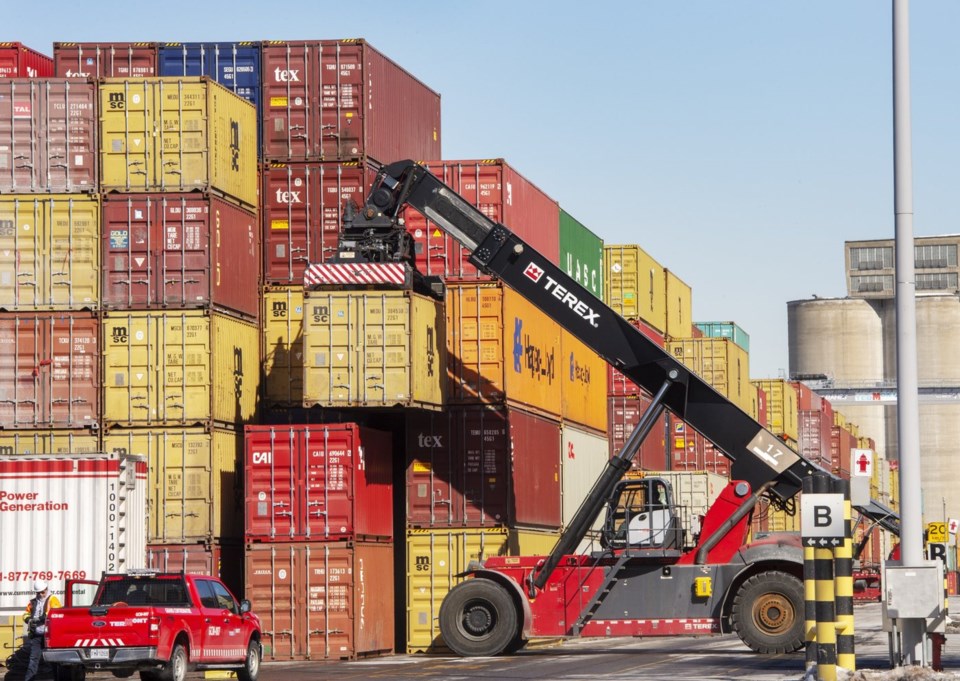OTTAWA — Prime Minister Mark Carney said Tuesday that expansions to ports in Montreal and Manitoba could be among the first projects fast-tracked under his government's new major projects bill.
Carney said the government will make an announcement about new port infrastructure "in the next two weeks."
"There is a lot happening, it's the number 1 focus of this government is to build that infrastructure," Carney said. "And, particularly, infrastructure that helps us deepen our partnership with our European partners."
The ports comments came as Carney was in Germany and then Latvia on Tuesday, expanding trade ties in Europe with new agreements on energy and critical minerals. Getting products like liquefied natural gas and critical minerals to Europe will likely require infrastructure upgrades at several Canadian ports.
Carney specifically identified the Contrecoeur expansion of the Port of Montreal as something that might be one of the first projects approved under his government's major projects bill. The expansion is to increase container capacity out of Montreal by as much as 40 per cent.
The government passed Bill C-5 in just two weeks in June, allowing it to quickly approve major projects it considers to be in the national interest. It is part of the government's effort to swiftly ramp up Canada's domestic economy and production, and find ways to expand trade away from the United States as President Donald Trump upends the global economy with his tariff war.
Carney said Bill C-5 doesn't eliminate the requirement for an environmental assessment but that it can be done by the province of Quebec, rather than having certain aspects of the review done by both levels of government.
What Carney described as "effectively" a new port in Churchill on Hudson's Bay in northern Manitoba, so it can ship liquefied natural gas, was also on his list of port projects that could be approved within weeks.
"It's one of the first potential ones, but there is much more to it than Contrecoeur in terms of what it potentially unlocks," Carney said about the Churchill project. "It unblocks major Indigenous leadership and participation, it potentially unlocks pathways for critical minerals and links into Europe."
The port in Churchill has largely been an export site for grain, but investments in recent years have expanded its offerings, including last summer, seeing the first critical mineral shipment out of the port in more than two decades. There are also proposals to upgrade the port so it can ship LNG.
Carney also mentioned the possibility of projects coming for ports on the East Coast related to critical minerals and metals.
"What are one of the elements that get projects up to the level of national interest? Diversification," Carney said. "Diversification across provinces, diversification of market, diversification of new activities that we haven't been doing at scale, because all of those elements are gonna make the country stronger, make us more resilient, make us more prosperous across all of Canada."
Manitoba Premier Wab Kinew spoke to media over Zoom from Brandon, Man., on Tuesday. He would not elaborate on what the announcement could be but said his government has been speaking with Carney and cabinet ministers about making a case for the Port of Churchill.
"It's certainly a culmination of a lot of efforts on the part of people in Manitoba over the years to build up our port in Churchill, to build our Prairie economy and it's a sign that when our governments work together, including with Indigenous governments, we're going to be able to build a prosperous future for everybody," Kinew said.
Kinew said Churchill is well positioned to serve the European Union. He also said it's encouraging to hear the prime minister talking about Manitoba's competitive advantage, which is a port in the north that can bring western Canadian natural resources to international markets.
Questioned about the environmental effects of opening up the port to longer shipping seasons, Kinew said "the reality is we want to build the infrastructure in Churchill to the next stage."
"We want to build up this great port and rail line that we have today, layer on another layer of infrastructure on top of that," Kinew said. "And when we do that, of course, we're going to look at the environmental angle.
"And by the way, if we're now talking steel and aluminum and icebreakers building up this infrastructure in northern Manitoba, that's more opportunity for Ontario steel mills, Saskatchewan steel mills, Manitoba steel mill as well. That's more opportunity for Quebec aluminum."
Chris Avery, president and CEO of Arctic Gateway Group, said it welcomes Carney's commitment to Churchill.
"The Port of Churchill is ready to step up and play a vital role in diversifying Canada’s trade, growing our energy and critical minerals exports, and strengthening sovereignty in the North," Avery said.
"As an Indigenous- and northern-owned company, AGG is committed to ensuring that any development in the North creates lasting benefits for northern communities and Indigenous rights-holders while building critical trade capacity for Canada."
— With files from Brittany Hobson in Winnipeg
This report by The Canadian Press was first published Aug. 26, 2025.
Catherine Morrison, The Canadian Press




